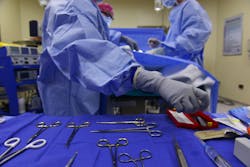CMS issues recommendations for elective procedures; industry warns of testing supply shortages
The Centers for Medicare & Medicaid Services (CMS) released guidelines about how to reopen healthcare systems for elective procedures in geographic areas with low and stable volumes of COVID-19 cases.
Meanwhile, two large industry groups— the American Association for Clinical Chemistry (AACC) and the Association of American Medical Colleges (AAMC)—recently said that ongoing problems procuring supplies are hampering laboratories ability to test as many people as possible for SARS-CoV-2. Both groups suggested that the federal government play a role in sourcing personal protective equipment (PPE), as well as supplies needed to collect specimens and perform testing.
“Unless and until these supply chain issues are resolved, the nation’s laboratories will remain stymied in their attempts to maximize their testing capacity. At this point, the biggest barrier to testing is not capacity, but access to vital supplies,” Carmen Wiley, PhD, president of AACC, said.
The new CMS recommendations are specifically targeted to communities with low incidence or relatively low and stable incidence of COVID-19 cases, the agency said.
The recommendations update earlier guidance from CMS on limiting non-essential surgeries and medical procedures. The new CMS guidelines recommend a gradual transition and encourage healthcare providers to coordinate with local and state public health officials, and to review the availability of personal protective equipment and other supplies, workforce availability, facility readiness and testing capacity.
CMS said that healthcare facilities located in areas still seeing high volumes of COVID-19 cases should continue following the recommendations issed by CMS last month, which are designed to expand capacity to care for patients with COVID-19, reduce the risks of transmission and exposure to patients, and to conserve supplies, especially PPE, and manpower.
Carmen Wiley, PhD, president of the AACC, called on the federal government to coordinate supply distribution. “The only entity in this crisis with the power to source the necessary supplies on a large scale and route them to those areas they are most needed—whether an N95 mask, testing reagents, or a testing swab—is the federal government. Laboratories and diagnostics manufacturers are rapidly scaling up testing even in the face of these dire problems with the supply chain.”
In addition to playing a role in managing supply-chain issues, AAMC officials suggested that the federal government work with the healthcare industry to develop a web portal that allows labs to report supply shortages and a communication system to make vendors aware of what supplies labs need.

